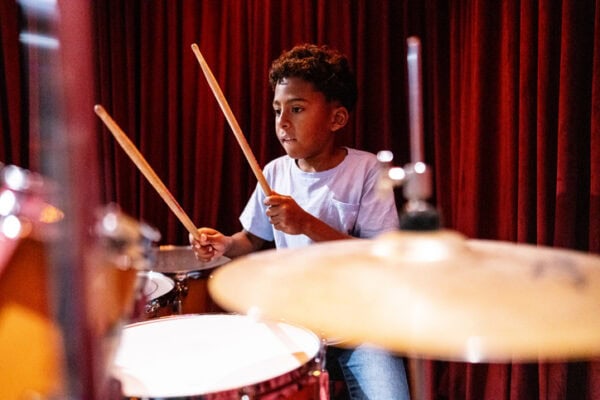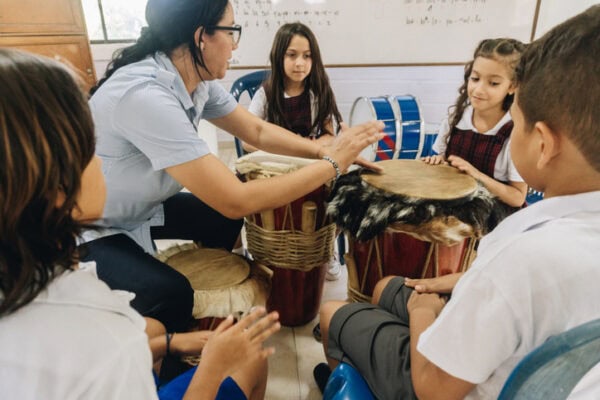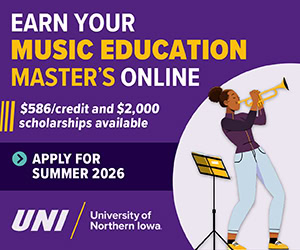/ News Posts / Supplementing Learning and Orchestrating a Fuller Life through Music
Supplementing Learning and Orchestrating a Fuller Life through Music
This blog is sponsored by NAfME Corporate member Hawai’i Youth Symphony.
The power of music can help to orchestrate a fuller life in nearly every aspect by relieving stress, enhancing cognitive development and providing an outlet for artistic expression. Additionally, music education can help fill gaps in learning that often occur when school is out of session. Group classes, private lessons, and tailored summer music programs are all fun and engaging ways to keep the momentum going.
What Is Supplemental Curriculum?
Lack of structure and curriculum can lead to academic regression, negatively impacting previously mastered skills, knowledge retention, and overall performance. The solution is supplemental curriculum, which is designed to combine additional resources with the core curriculum to support and enhance learning. This kind of curriculum is tailored to the student’s unique interests, hobbies, and skillset to ensure engagement and maximum growth.
Some examples of supplemental curriculum include academic summer camps, workshops, online courses, enrichment programs, summer courses, and more! Hawaiʻi Youth Symphony (HYS) has its own version of this—it is called Pacific Music Institute (PMI). PMI is a week-long summer music intensive that invites intermediate and high school students from Hawaiʻi, the Continental United States, and beyond to enroll in various programs according to their instrument and experience. Here, they receive instruction from music educators from across the nation and participate in sectionals, rehearsals, performances, and more. It provides a safe place for students to meet friends with similar passions, play in different venues, interact with professional musicians, and work on a variety of skills, including those that may have ended up fading away over the summer and new ones as well!
“Extracurricular music programs were an integral part of my identity when I was growing up. I found music to be something I particularly excelled in, so they provided the space to challenge myself and give confidence to myself and my abilities,” said HYS alumnus, oboist, and music educator Alex Hayashi. “This all culminated in pursuing my passion in music. I was able to study music through my college and graduate degrees, and I am now able to teach the next generation of music students.”
“I encourage my students to participate in extracurricular programs because they are incredibly enriching, both as a musician and as a person,” continued Hayashi. “There is something to be said about coming together with other students and working together to accomplish the feat of performing music. Students get to work with others in a different capacity than they would at school, while learning new things about music, composers, musical styles, and more.”
How Do Students Benefit from Music-Focused Supplemental Curriculum?
One study found that 70-78% of elementary school students lost ground in math and 62-73% in reading over the summer. This number was even greater for students transitioning from elementary to intermediate school at 84%. At the same time, these findings indicate that 22-38% of students showed gains, which would imply that the summer slide is not inevitable.
Research also shows that students who study music generally perform better in school, with higher grades, improved literacy, and more likelihood to graduate. We have even seen that learning to play a musical instrument can increase one’s skills and brain power more than learning how to code.
Music requires one’s brain, body, and emotions, making it a uniquely challenging and immersive experience. For many students, learning music is substantially more engaging than looking at a book or screen and doing math problems. Finding interactive learning opportunities is the key to ensuring children are happy and willing to learn—even during their breaks from school.
“Learning to play an instrument requires intense focus, patience, and resilience. It’s not an easy process—progress is often incremental and hard-won—but the journey teaches persistence and the value of hard work,” said HYS alumnus, percussionist, band director, and PMI general manager Jeremy Lawi. “Extracurricular music programs are an incredible way to meet new people, build lasting friendships and have fun. There’s something truly special about connecting with others through a shared passion for music. The collaborative process is as rewarding as the performances themselves.”
How Do You Implement Supplemental Curriculum?
First, find out what interests your student. If it is music, what kind of music do they like? Classical or jazz? Would they prefer to work one-on-one with a teacher, in a small ensemble, or in a large orchestra? Once these factors have been taken into consideration, it is time to start your research! When school is out of session, you may even consider programs that are outside of your county or state, allowing students to travel to new and safe environments while expanding their horizons even further! Some programs offer financial assistance to subsidize travel costs.
Once you have found a program that fits your student’s interests and schedule, enroll them and work together to apply for financial aid and scholarships from the presenting organization and other sources as needed. As you invest your time, effort and funds into providing these experiences, remember to enjoy watching your child’s continued growth.
“Musical opportunities outside of school were so important to me and exposed me to so many different peers and mentors, be it from different cultures, socio-economic classes, or nationalities. This exposure really helped me to navigate the world as an adult,” said HYS alumna, violinist, and music educator Zoë Martin-Doike.
By recognizing the importance of supplemental curriculum and implementing it in your student’s education plan, you are making a profound impact on their academic, social, emotional, and artistic development. This will open doors to new and exciting opportunities you could never have even imagined before!
Interested in reprinting this article? Please review the reprint guidelines.
The National Association for Music Education (NAfME) provides a number of forums for the sharing of information and opinion, including blogs and postings on our website, articles and columns in our magazines and journals, and postings to our Amplify member portal. Unless specifically noted, the views expressed in these media do not necessarily represent the policy or views of the Association, its officers, or its employees.
Published Date
March 18, 2025
Category
- Lifelong Learning
- Social Emotional Learning
Copyright
March 18, 2025. © National Association for Music Education (NAfME.org)






